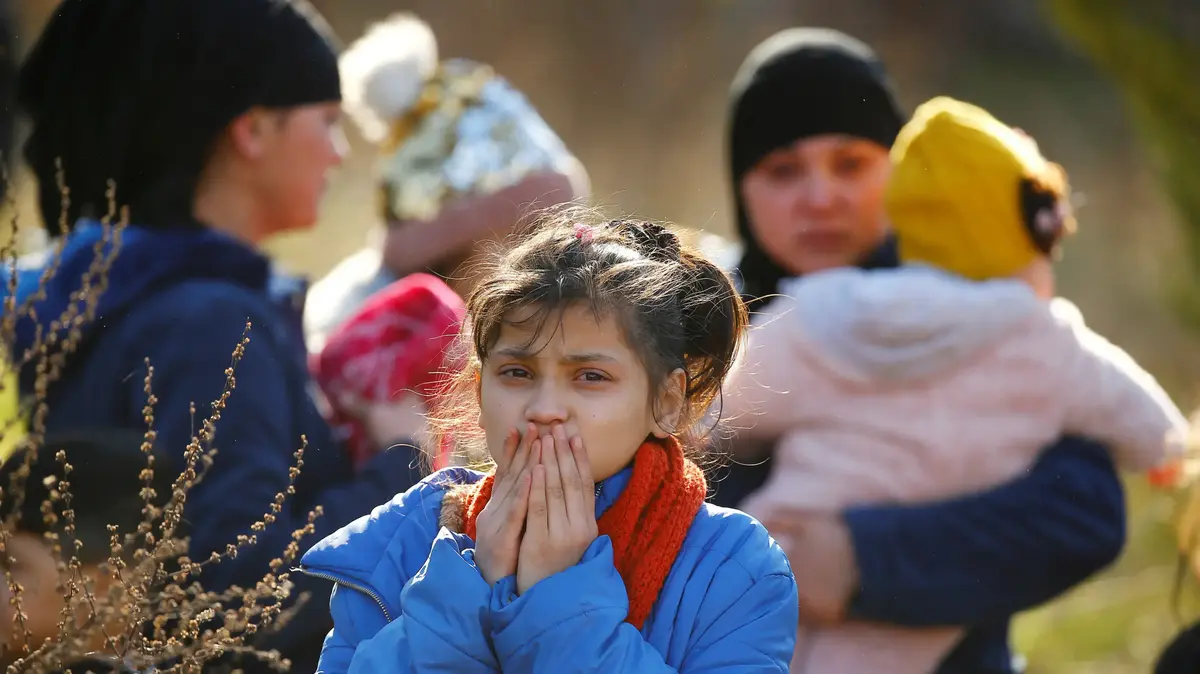Does Tiktok profit at the expense of refugees from Syria?
According to a new publication, the social network collects a commission at the rate of 70% of the donations that reach the families.
Stiktok, for its part, said it would take immediate action against "exploitative begging"
Voila system!
technology
12/10/2022
Wednesday, October 12, 2022, 1:42 p.m. Updated: 1:49 p.m.
Share on Facebook
Share on WhatsApp
Share on Twitter
Share by email
Share in general
Comments
Comments
Refugees gather near the Pazarkula outpost on Turkey's border with Greece, following the tensions in Syria's Idlib province.
February 28, 2020 (Photo: Reuters)
Is the Chinese social network Tiktok exploiting displaced families from Syria for financial gains?
According to a BBC investigation, the social network charges a commission at the rate of 70% of the donations that go to the families.
On TikTok, there is a growing phenomenon of children from Syria broadcasting live on the app, begging for digital gifts of monetary value.
According to the BBC, there are refugee families who managed to get up to $1,000 an hour from donors, but those families only received a small amount of the donation.
TikTok, for its part, said it would take immediate action against "exploitative begging" because, according to the company, this type of content is prohibited on its platform.
In addition, TikTok stated that the commission it takes on digital gifts is significantly lower than 70%, but declined to disclose the exact amount of the commission it charges.
The BBC found that in camps in northwest Syria, the trend is being aided by so-called "TikTok brokers", who have provided families with phones and equipment to broadcast live on the app.
The middlemen said they were working with TikTok-related agencies in China and the Middle East, which gave the families access to TikTok accounts.
According to them, these agencies are part of TikTok's global strategy to mobilize live streaming and encourage users to spend more time on the app.
According to the BBC, there are refugee families who have managed to get up to $1,000 an hour from donors.
Syrian refugees, archive (Photo: Reuters)
Because TikTok's algorithm suggests content based on the geographic location of a user's phone number, the brokers said the families tend to use British SIM cards.
This, because according to them the British are the most generous donors.
According to the BBC, Mona Ali al-Karim and her six daughters are among the refugee families in Syria who are begging for donations through TikTok.
They sit on the floor of their tent every day for hours, repeating some English sentences they know: "Give us a like, please share, please give a gift".
Mona's husband was killed in an airstrike, and Mona uses the live broadcasts to raise money for her blind daughter.
The gifts the family is asking for are virtual, but they cost real money and can be withdrawn from the app as cash.
Live viewers send the content creators the gifts - from digital roses, costing a few cents, to virtual lions costing about 500 dollars.
The BBC spent five months monitoring 30 TikTok accounts broadcasting live from refugee camps in Syria.
The broadcaster found that viewers often donate digital gifts worth up to $1,000 per hour per account.
At the same time, the families in the camps said that they receive only a tiny part of these amounts.
Since the Chinese social network refused to reveal how much money it collects from the gifts, the BBC conducted an experiment to see where the money goes. A reporter in Syria contacted one of the agencies associated with TikTok and said he lived in the camps.
He opened an account, while the BBC London team sent $106 worth of TikTok gifts from another account.
At the end of the live broadcast, the trial account balance was $33.
From here, TikTok took 69% of the gift value.
Marwa Patafte, from the digital rights organization Access Now, says in an interview with the BBC that these live broadcasts work against the social network's own policy to "prevent the harm, danger or exploitation" of minors on the platform: "TikTok clearly states that users may not explicitly request gifts, so which is a clear violation of their terms of service, as well as a violation of users' rights," she said.
good to know (in advance)
The secret to improving your sex life - now in a special sale
Served on behalf of "Gabra"
Tiktok (Photo: ShutterStock)
She acknowledges that people have the right to share their stories online "to try to find support and sympathy," but she says the live broadcasts are "disrespectful and humiliating."
According to the rules of the Chinese social network, each user must have at least 1,000 followers to go live, direct requests for gifts are prohibited and the platform must "prevent the harm, danger or exploitation" of minors.
But when the BBC used the in-app system to report 30 accounts featuring children begging for gifts, TikTok said there had been no breach of its policies in any of the cases.
After the BBC contacted TikTok directly for comment, the company deleted all accounts.
TikTok said in response: "We are very concerned about the information and allegations brought to us by the BBC, and have taken swift and strict action. This type of content is prohibited on our platform, and our global policy opposes exploitative begging."
technology
Social Networks
Tags
tiktok
Syria

